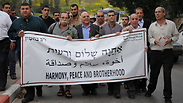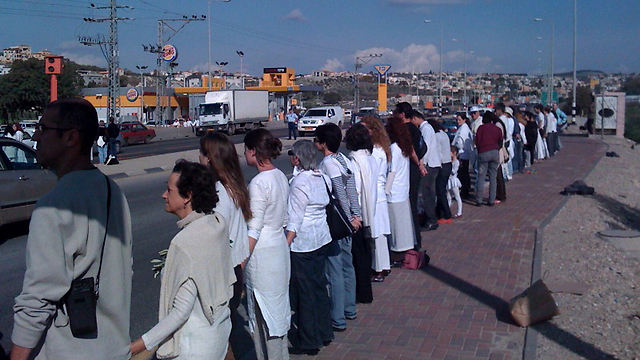
Understanding anti-normalization in Palestinian society
Op-ed: As far as many Palestinians are concerned, a public dialogue with Israelis is a false representation of normality, yet many Israelis are finding it difficult to accept this strong opposition. Nevertheless, it must not stop us from working together to build the immensely important bridges between the two people.
We were about 1,000 men and women. When we reached the entrance to the village, we were greeted by a handful of Palestinian “anti-normalization” activists who refused to let us in, even though the visit was coordinated in advance. A major argument broke out between the Palestinians themselves, as the Israeli activists and IDF soldiers stood aside watching them with astonishment. Eventually, it was decided that the situation was too explosive, and we turned back.
The event’s unexpected ending stirred up emotions: Some of the Israelis were offended, while others were disappointed. But what happened demonstrates more than anything how much we Israelis lack an understanding and awareness of internal processes within the Palestinian society against what the Palestinians refer to as “tatbia”—normalization with Israel.

Since the Oslo Accords, the Palestinian society in the territories has been following the multiplying coexistence and dialogue meetings between Palestinians and Israelis with growing reluctance. While representatives of the sides began meeting in cafés in Ramallah and Tel Aviv, travelling to conferences abroad together, hugging, kissing and eating hummus together—at the end of the day, the Palestinians returned to their refugee camps and to the humiliating occupation, and the Israelis returned to their convenient democracy.
And so, wide parts of the Palestinian society began feeling that while those people were hugging and kissing, allegedly forgetting the wrongs of the past, the situation on the ground was only getting worse: The number of settlers doubled, the roadblocks, the traffic restrictions, the home demolitions, the land theft and the killing and arrests of anti-occupation protestors increased. All this created an unbearable dissonance.
The growing discomfort over the unbearable situation was reflected in the growing use of the term “tatbia” (normalization). In the Palestinian political culture, this term basically reflects opposition to any joint Palestinian-Israeli activity that deviates from the framework of a struggle and is perceived as a sort of collaboration with the occupier.
As far as many Palestinians are concerned, that public dialogue with Israelis is a false representation of normality—as if both sides share equal strength and as if justice is equally divided between them. So any cooperation and dialogue between the sides are immediately suspected by many as a normalization attempt and encounter strong opposition from those in the Palestinian society who are working to prevent it—even at the cost of boycotting Israeli peace activists who wish to help them.
Many Israelis are finding it difficult to accept this opposition and don’t understand why Palestinians are rejecting a hand extended in peace. Even though we can’t judge the occupied side from our superior position as rulers, it’s important to continue the efforts for a joint struggle against the occupation and its wrongs.
We must not let an incident like the one that took place in Beit Jala cloud the holy reconciliation work or serve as an excuse for some of us to avoid the effort to build immensely important bridges between the people. Just like we sometimes face elements in the Israeli public who oppose any type of contact with the Palestinians, our Palestinian partners are forced to face harsh criticism from radical elements opposing any contact with Israelis.
We must try to understand each other, honor our Palestinian partners who are courageously standing at the forefront of the battle against their society, and keep deepening the joint activity of those who believe in peaceful cooperation against the occupation.
Rami Elhanan is the Israeli co-executive director of the Parents Circle—Families Forum (PCFF), a joint Palestinian-Israeli organization of bereaved families.










